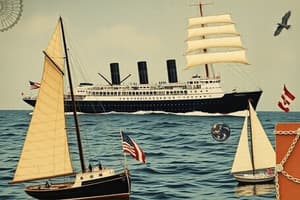Podcast
Questions and Answers
Passing other vessel at anchorage – pass ______ of her.
Passing other vessel at anchorage – pass ______ of her.
astern
Change to ______ steering in congested waters.
Change to ______ steering in congested waters.
hand
Narrow channel – vessel ______ the tide has to wait and give way to vessel having tide from astern.
Narrow channel – vessel ______ the tide has to wait and give way to vessel having tide from astern.
stem
Coming to anchorage area – good and clear ______ circle.
Coming to anchorage area – good and clear ______ circle.
Vessel not under command (NUC) ______ – own ship which is not under command has to take action to avoid collision.
Vessel not under command (NUC) ______ – own ship which is not under command has to take action to avoid collision.
Nothing these Rules shall ______ any vessel, or the owner, master or crew thereof, from the consequences of any neglect to comply with these Rules or of the neglect of any precaution which may be required by the ordinary practice of seamen or by the special circumstances of the case.
Nothing these Rules shall ______ any vessel, or the owner, master or crew thereof, from the consequences of any neglect to comply with these Rules or of the neglect of any precaution which may be required by the ordinary practice of seamen or by the special circumstances of the case.
The ordinary practice of seamen includes ______ to other vessel at anchorage.
The ordinary practice of seamen includes ______ to other vessel at anchorage.
The ordinary practice of seamen includes changing to ______ steering in congested waters.
The ordinary practice of seamen includes changing to ______ steering in congested waters.
The ordinary practice of seamen includes coming to anchorage area with a good and clear ______ circle.
The ordinary practice of seamen includes coming to anchorage area with a good and clear ______ circle.
The ordinary practice of seamen includes a vessel ______ the tide has to wait and give way to vessel having tide from astern in a narrow channel.
The ordinary practice of seamen includes a vessel ______ the tide has to wait and give way to vessel having tide from astern in a narrow channel.
Flashcards
Passing anchored vessel
Passing anchored vessel
Pass behind the other vessel.
Steering in congestion
Steering in congestion
Engage manual steering.
Vessel stemming the tide
Vessel stemming the tide
Give way in a narrow channel to the vessel being pushed by the tide.
Safe anchoring circle
Safe anchoring circle
Signup and view all the flashcards
NUC overtaking
NUC overtaking
Signup and view all the flashcards
Exonerate vessel
Exonerate vessel
Signup and view all the flashcards
Passing other vessel at anchorage
Passing other vessel at anchorage
Signup and view all the flashcards
Changing to hand steering
Changing to hand steering
Signup and view all the flashcards
Coming to anchorage swinging circle
Coming to anchorage swinging circle
Signup and view all the flashcards
Vessel stemming
Vessel stemming
Signup and view all the flashcards
Study Notes
General Rules
- International Regulations for Preventing Collisions at Sea (COLREG) apply to all vessels on the high seas and in all waters connected to the high seas.
- Special rules made by an appropriate authority for roadsteads, harbors, rivers, lakes, or inland waterways must conform to COLREG as closely as possible.
- Due regard must be had to all dangers of navigation and collision, and to any special circumstances that may make a departure from COLREG necessary to avoid immediate danger.
Definitions
- A vessel includes every description of watercraft, including non-displacement craft and seaplanes, used or capable of being used as a means of transportation on water.
- A power-driven vessel is any vessel propelled by machinery.
- A sailing vessel is any vessel under sail, provided that propelling machinery, if fitted, is not being used.
Responsibility
- Nothing in COLREG exonerates any vessel, or the owner, master, or crew thereof, from the consequences of any neglect to comply with COLREG or of the neglect of any precaution required by the ordinary practice of seamen or by the special circumstances of the case.
- Examples of ordinary practice of seamen include:
- Passing other vessels at anchorage by passing astern of them.
- Changing to hand (manual) steering in congested waters.
- Ensuring a good and clear swinging circle when coming to an anchorage area.
- Vessels stem the tide having to wait and give way to vessels having tide from astern in narrow channels.
- Examples of special circumstances of the case include:
- Vessel not under command (NUC) overtaking – own ship which is not under command has to take action to avoid collision.
Studying That Suits You
Use AI to generate personalized quizzes and flashcards to suit your learning preferences.




